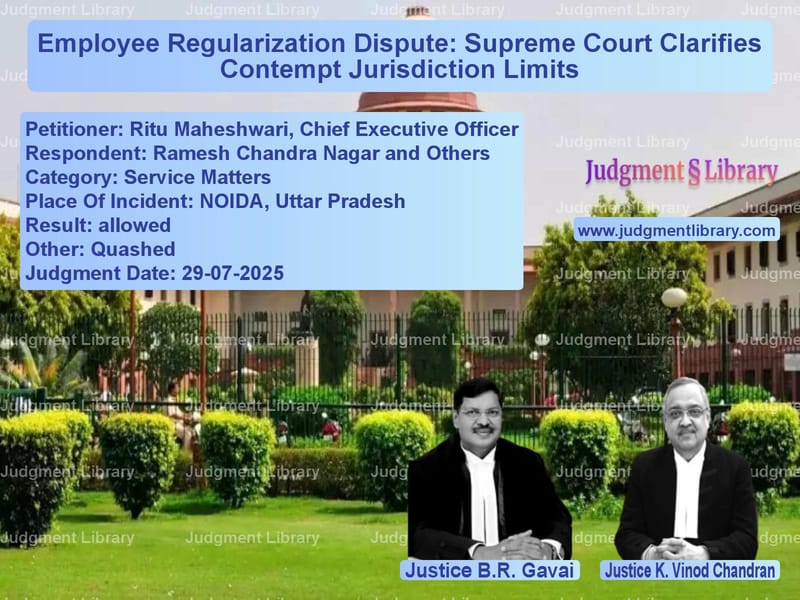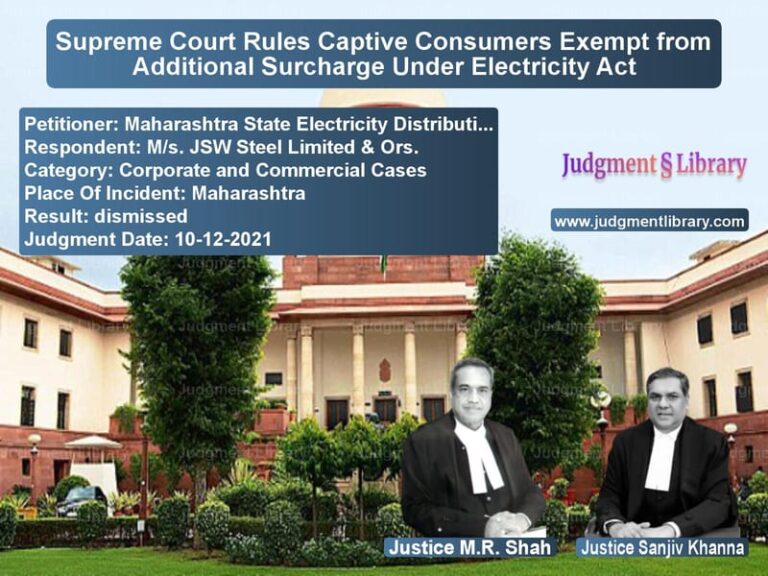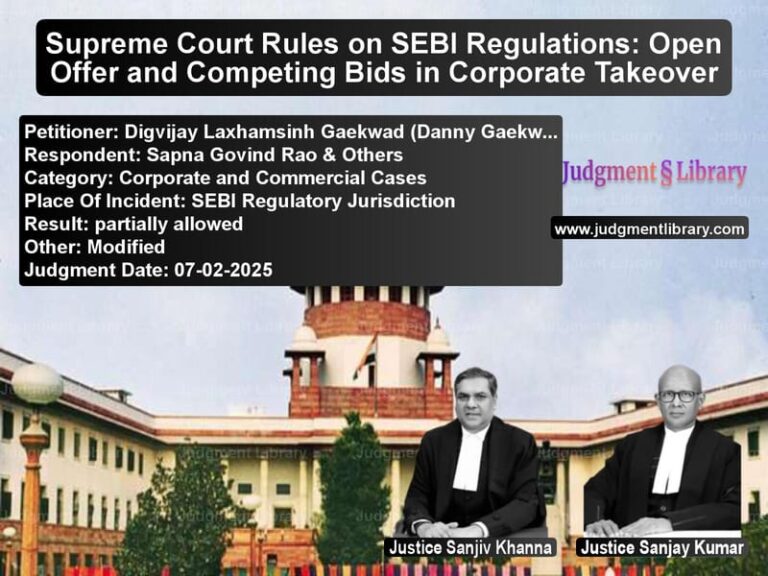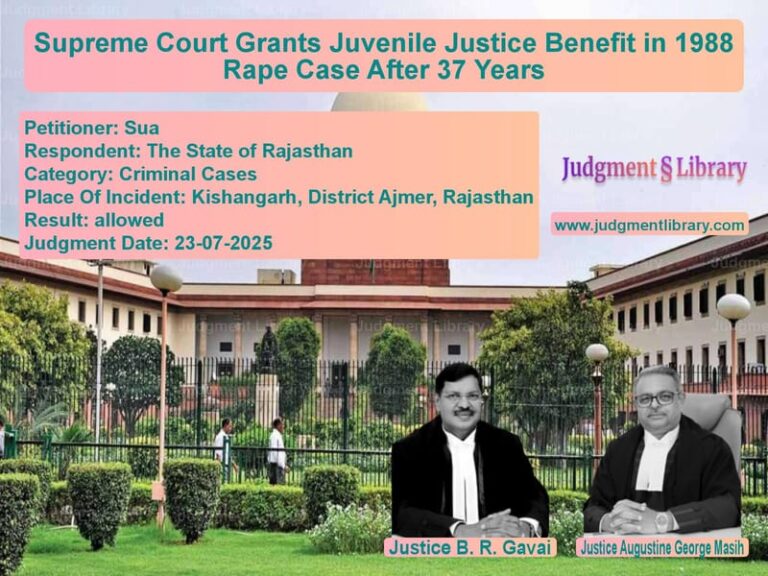Employee Regularization Dispute: Supreme Court Clarifies Contempt Jurisdiction Limits
In a significant ruling that clarifies the boundaries of contempt jurisdiction in service matters, the Supreme Court recently delivered a judgment that protects administrative autonomy while safeguarding employee rights. The case involving Ritu Maheshwari, the Chief Executive Officer of NOIDA, and several drivers seeking regularization of their services, highlights the delicate balance between judicial oversight and administrative decision-making. The dispute, which traveled through multiple rounds of litigation before reaching the apex court, centered on whether a government official could be held in contempt for rejecting employee regularization claims after being directed to reconsider them. The Supreme Court’s judgment, delivered by a bench comprising Chief Justice B.R. Gavai and Justice K. Vinod Chandran, provides crucial guidance on when administrative decisions constitute genuine compliance with court directions and when they cross into the territory of contempt.
The story began with several drivers engaged by the New Okhla Industrial Development Authority (NOIDA) who had been fighting for regularization of their services for years. Their journey through the legal system saw multiple petitions and representations, all aimed at securing permanent employment status. The crucial turning point came when the Chairman and CEO of NOIDA rejected their claims for regularization through an order dated November 8, 2017. This rejection prompted the drivers to approach the High Court, challenging the decision and seeking regularization of their services. The High Court, in its order dated February 4, 2020, made significant observations about how the regularization claims had been handled. The Court noted that the employer’s stand that the petitioners were contractual employees engaged through contractors was not substantiated by relevant material. The High Court emphasized that the State Government had taken a conscious decision to provide regular appointments to daily wagers, contractual, and work charge employees working in government establishments and local authorities.
The High Court specifically found that the rejection of the drivers’ claims was problematic because it brushed aside their regularization requests solely on the ground that they were engaged for intermittent work through a contractor. The period of engagement hadn’t been properly considered, and no engagement records had been produced before the Court. The High Court concluded that the impugned order resulted from non-application of mind by the CEO and set it aside. The Court then gave clear directions: “The Chief Executive Officer, NOIDA, Ghaziabad, U.P shall consider the claim of the petitioners afresh for regularization keeping in view of the observations made hereinabove, strictly in the light of the qualifying conditions of the Government Order dated 24.2.2016 or the Regularization Rules’ 2016, as on the date of submission of their representation rejected vide order dated 8.11.2017. As to the other qualifying conditions under the Government Order/Regularisation Rules such as cut off date, qualification etc., the same would have to be considered by the competent Authority i.e. Chief Executive Officer, NOIDA considering the facts of individual case of each petitioner herein.” The crucial rider was that the petitioners couldn’t be treated as contract labor hired through registered contractors in the absence of valid contracts under the CLRA Act.
The Compliance and Subsequent Contempt Proceedings
Following the High Court’s directions, NOIDA constituted a committee to examine the drivers’ claims. Based on the committee’s report, the CEO passed orders on August 17, 18, and 19, 2021, rejecting the regularization claims once again. However, this time, the rejection was based on multiple grounds including the qualifications of the respondents vis-à-vis the Government Order dated February 24, 2016, the committee’s report, the effect of a subsequent Government Order dated September 18, 2018, and the additional financial burden on NOIDA. The drivers, feeling aggrieved by what they perceived as repeated rejection on similar grounds, filed a contempt petition alleging that the CEO had willfully disobeyed the High Court’s directions. The learned Single Judge of the High Court, in the impugned order dated October 6, 2021, came to a prima facie conclusion that a case of contempt was made out and that charges should be framed against the CEO. However, taking a lenient view, the Court granted one last opportunity for compliance, warning that failure would lead to prosecution under the Contempt of Courts Act, 1971. This interim order led the CEO to approach the Supreme Court, setting the stage for the final adjudication.
The Arguments Before the Supreme Court
Before the Supreme Court, Mr. Tushar Mehta, the learned Solicitor General of India appearing for the appellant CEO, made compelling arguments. He submitted that the order dated February 4, 2020, required NOIDA to consider the claims of the respondents afresh and decide them in accordance with law by passing a reasoned order. He emphasized that in pursuance of this direction, the claims of each respondent had been duly considered and rejected through speaking orders. Therefore, the contempt petition itself was not tenable since there was no disobedience of the High Court’s directions. The Solicitor General’s position was that as long as the authority had applied its mind and considered all relevant factors, the mere fact that the decision went against the employees couldn’t constitute contempt. On the other side, Ms. V. Mohana, learned senior counsel appearing for the respondent drivers, presented the human aspect of the litigation. She submitted that the respondents had been dragged into a series of litigation through no fault of their own. She argued that the order dated February 4, 2020, contemplated the regularization of the drivers’ services, and the subsequent rejection was based on the very same grounds that had already been set aside by the High Court. Ms. Mohana also raised a preliminary objection, contending that since the contempt petition was still pending and hadn’t been finally decided by the High Court, the appeal itself was not tenable at this stage.
The Supreme Court’s Analysis and Reasoning
The Supreme Court carefully analyzed the sequence of events and the legal principles governing contempt jurisdiction. The Court noted that the High Court’s order dated February 4, 2020, primarily required fresh consideration of the respondents’ claims, giving liberty to the appellant to examine each case individually, including qualifications, cut-off dates, and applicability of government orders and rules. The only specific restriction was that regularization couldn’t be denied solely on the ground that the employees were engaged through a contractor. Examining the impugned orders dated August 17, 18, and 19, 2021, the Court found that the respondents’ claims had been rejected on four substantive grounds: qualifications under the Government Order of 2016, the committee’s report, applicability of the 2018 Government Order, and the additional financial burden on NOIDA. The Court observed that these considerations went beyond the prohibited ground of contractual engagement and represented genuine application of mind to multiple relevant factors. The Supreme Court made a crucial distinction that lies at the heart of contempt jurisprudence: “It could thus be clearly seen that the respondents’ claim was not rejected solely on the ground that they were employed through a contractor but was rejected after a thorough consideration of several other grounds. In that view of the matter, the orders dated 17.08.2021, 18.08.2021 and 19.08.2021 must be considered as compliance with the directions issued under the order dated 04.02.2020.” The Court emphasized that if the respondents were aggrieved by the reasoning in the rejection orders, their remedy lay in challenging those orders on merits through appropriate proceedings, not through contempt petitions.
The Court’s Final Ruling and Directions
The Supreme Court allowed the appeal and quashed the impugned order of the High Court. However, the Court exercised its supervisory jurisdiction to modify the rejection orders by deleting one specific ground that referred to a similar case involving Greater Noida Authority. The Court found this reference unnecessary and directed its removal from the orders. The deleted portion read: “E. In respect of similar cases related to Greater Noida. In Special Leave Petition (C) No. 2452 of 2020, Greater Noida Industrial Development Authority, Vs. Ashok Kumar and Ors. filed by Greater Noida, Authority against the order passed by Hon’ble, High Court in a similar matter to that of the present case in which the Hon’ble High Court, directed the Greater Noida Authority to regularize, the drivers who were working on contract basis, through suppliers and the order in Contempt Application in the aforesaid matter, the Hon’ble Supreme Court, vide order dated 31.1.2021, has stayed the effect operation of the orders passed by Hon’ble High Court in Contempt Applications – ‘Issue notice returnable on 6.3.2020. Pleadings to be completed in the meanwhile. There shall be stay of contempt proceeding in the meanwhile.’ It is thus clear from the above that in a similar case, the Hon’ble Court has not permitted regularization in a similarly situated Institution i.e. Greater Noida Authority and the Hon’ble Supreme Court was pleased to stay the contempt order passed by Hon’ble High Court.” The Supreme Court clarified that while setting aside the contempt proceedings, the respondents were at liberty to challenge the rejection orders on merits. If such challenge was made, the courts would consider it in accordance with law, excluding the deleted portion from consideration. The Court also granted the benefit of Section 14 of the Limitation Act for the period during which the respondents were pursuing the matter before the Supreme Court.
The Wider Implications of the Judgment
This judgment carries significant implications for administrative law and contempt jurisprudence. It reaffirms the principle that contempt jurisdiction should be exercised sparingly and only in cases of willful disobedience of clear and specific court directions. The ruling protects administrative authorities from being held in contempt merely because their decisions don’t favor the litigants, as long as they have genuinely complied with the court’s directions by applying their mind to relevant considerations. At the same time, the judgment safeguards the rights of employees by keeping open their avenue to challenge administrative decisions on merits. The Court’s approach balances the need for administrative autonomy with judicial oversight, ensuring that authorities don’t use contempt fears as an excuse to bypass proper decision-making procedures. For countless employees across various government and quasi-government establishments fighting for regularization, this judgment clarifies that while courts will ensure fair consideration of their claims, they cannot guarantee particular outcomes through contempt proceedings. The ruling ultimately strengthens both the rule of law and the principles of natural justice in service jurisprudence.
Petitioner Name: Ritu Maheshwari, Chief Executive Officer.Respondent Name: Ramesh Chandra Nagar and Others.Judgment By: Justice B.R. Gavai, Justice K. Vinod Chandran.Place Of Incident: NOIDA, Uttar Pradesh.Judgment Date: 29-07-2025.Result: allowed.
Don’t miss out on the full details! Download the complete judgment in PDF format below and gain valuable insights instantly!
Download Judgment: ritu-maheshwari,-chi-vs-ramesh-chandra-nagar-supreme-court-of-india-judgment-dated-29-07-2025.pdf
Directly Download Judgment: Directly download this Judgment
See all petitions in Employment Disputes
See all petitions in Contractual Employment
See all petitions in Public Sector Employees
See all petitions in Termination Cases
See all petitions in Judgment by B R Gavai
See all petitions in Judgment by K. Vinod Chandran
See all petitions in allowed
See all petitions in Quashed
See all petitions in supreme court of India judgments July 2025
See all petitions in 2025 judgments
See all posts in Service Matters Category
See all allowed petitions in Service Matters Category
See all Dismissed petitions in Service Matters Category
See all partially allowed petitions in Service Matters Category







